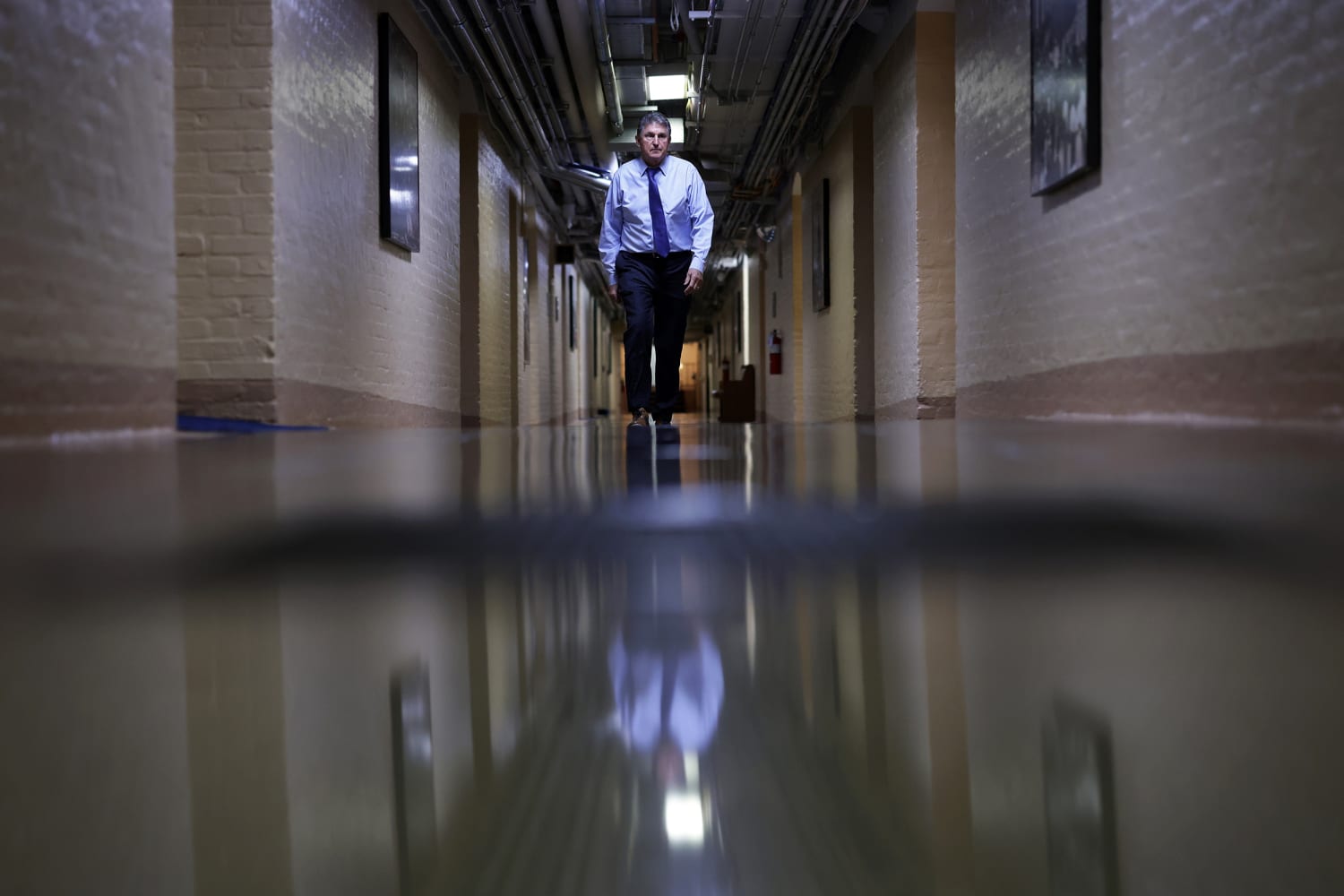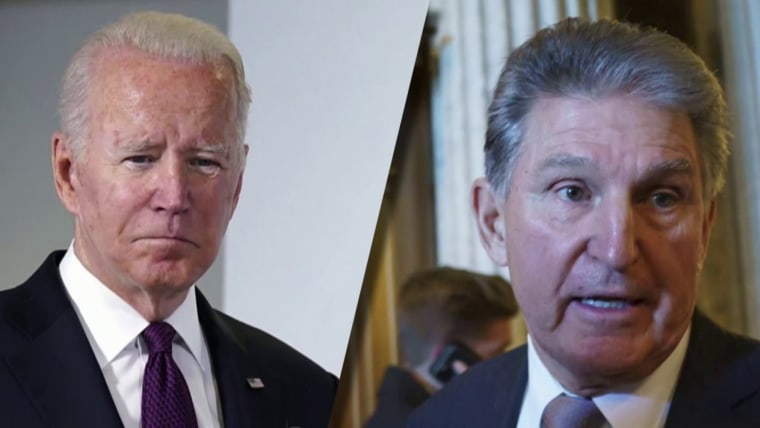WASHINGTON — Democrats, stunned and angry at Sen. Joe Manchin’s move Sunday to knife the Build Back Better Act, are grappling with whether President Joe Biden’s signature legislation can be salvaged in a smaller form.
Based on remarks by Manchin, D-W.Va., some lawmakers see a glimmer of hope that the roughly $2 trillion bill could still be restructured to meet his demands, albeit with painful sacrifices.
Put another way: The patient may not have a heartbeat, but they believe it can still be resuscitated.
“At the start of these negotiations many months ago, we called for prioritizing doing a few things well for longer, and we believe that adopting such an approach could open a potential path forward for this legislation,” Rep. Suzan DelBene, D-Wash., the chair of the moderate New Democrat Coalition, said in a statement. “Failure is not an option.”
White House chief of staff Ron Klain tweeted DelBene’s statement with praise. Facing unanimous Republican opposition, Democrats need all 50 of their caucus members in the evenly split Senate to support the legislation, or it is certain to fail.
But the survival of the Build Back Better project — to ease pocketbook pressure on Americans and combat climate change — remained uncertain Sunday as shellshocked Democrats unloaded on Manchin, some of them questioning his character and suggesting that he caved in to special interests.
“Just as Senator Manchin reversed his position on Build Back Better this morning, we will continue to press him to see if he will reverse his position yet again, to honor his prior commitments and be true to his word,” White House press secretary Jen Psaki said.
People close to Manchin were taken aback by the tenor of the backlash.
Asked whether the bill can be saved, a source familiar with Manchin’s thinking said: “It’s dead right now. Hypotheticals are possible I guess but we are far from that when the President and Dem leadership are releasing statements like they did today.”
Democrats try to stay optimistic
The $2 trillion Build Back Better Act has passed the House and is being considered by the Senate, where party leaders say the 49 other members of the Democratic caucus are ready to move forward.
The hunger to pass the bill is palpable, as it is a rare glimmer of political hope for Democrats heading into the 2022 midterm elections, remaining popular in surveys even as Biden’s approval rating falls and the party loses its edge in congressional races.
Other Biden priorities, like voting rights legislation, have even slimmer chances of passage, and Democrats are trying to stuff as many economic priorities into this bill because they have a once-per-fiscal-year opportunity to bypass the filibuster for budgetary measures.
Manchin has been vocal about his reservations about a large social safety net bill throughout the negotiations, prompting House progressives to insist on pairing it with the bipartisan infrastructure law. The two bills were de-linked last month after Biden and party leaders pushed to pass the transportation measure.
As the initial anger at Manchin wore off, numerous Democrats sought to take the optimistic view, grabbing on to his hint that he could be open to a restructured package even as he cited familiar concerns, such as inflation and adding to the national debt.
“Sometimes things have to blow up to come back together,” a House Democratic aide said.
Jesse Ferguson, a veteran Democratic strategist, compared the situation to the Affordable Care Act legislative effort in 2010, when then-Rep. Bart Stupak, D-Mich., rallied a group of conservative Democrats in threatening to kill the bill unless it included new restrictions on abortion funding.
Eventually, Speaker Nancy Pelosi, D-Calif., cut a deal with the holdouts, and the bill passed.
“Dems do their best work when in disarray,” Ferguson said. “When in array, everyone feels nervous and uncomfortable.”
Appearing on “Fox News Sunday,” Manchin said he was “a no on this legislation.”
Progressive advocacy groups see parallels in that language to Manchin’s firm declaration in June that he would vote against the For the People Act, a sweeping overhaul of voting and ethics rules. Democrats went back to the negotiating table and hammered out a revised bill that included many of the original priorities. In September, they introduced the Freedom to Vote Act, with Manchin as a co-sponsor — although the legislation would still need the support of 10 Republicans to pass.
Rep. Josh Gottheimer, D-N.J., a moderate who worked with Manchin to craft the bipartisan infrastructure law, promised on Twitter to “help bring everyone back to the table” on an economic package.
“I am hopeful that we can find common ground to help lower prescription drug costs, cut taxes for middle class families with SALT, invest in pre-k for children, and accomplish other commonsense priorities,” he said.
What could a revised bill include?
Manchin said Sunday that the government should focus on mitigating inflation and tackling the omicron variant of the coronavirus. He hinted at a road map to a potential revised bill, saying he is open to new programs as long as they are fully funded over 10 years.
“So if you’re going to do something and do it, pick what our prized priorities are … and you fund them for 10 years and you make sure they deliver the services for 10 years,” Manchin said. “It’s hard to deliver service for one year or three years or five years, and how are we going to continue them, unless it’s going to put a burden, unless we have to go back and make adjustments? But we should be upfront and pick our priorities. That’s the difference.”
A senior Senate Democratic aide said there is “a window for three or four items” that are fully funded over a decade.
That would be a departure from the existing Build Back Better Act, which includes a broad range of programs, some of which expire after a few years. That was done to lower the sticker price as demanded by Manchin and centrist Sen. Kyrsten Sinema, D-Ariz.
DelBene identified the $250 to $300 monthly child cash payments, expanded Affordable Care Act subsidies, climate change provisions and economic development grants as focal points.
Manchin has previously suggested that the popular child tax credit payments in the Build Back Better Act should be a standalone bill. But that would need 60 votes to pass, which is extremely unlikely.
Numerous Democrats emphasized that the U.S. could squander its last, best hope to tackle climate change without provisions in the Build Back Better legislation. The House-passed bill includes a $555 billion investment.
“The planet is not going to pause its warming process while we sort our politics out. We owe it to future generations to figure out what can pass and pass it,” said Sen. Brian Schatz, D-Hawaii.
Senate Finance Committee Chair Ron Wyden, D-Ore., said it is “extremely disappointing” to have to drop some priorities, but he suggested that Congress could refocus on providing financial security, lowering health care and prescription drug costs, and creating clean energy jobs.
“The Finance Committee has put forward a revenue menu with more than enough options to permanently pay for these priorities,” he said.
Source: | This article originally belongs to Nbcnews.com











